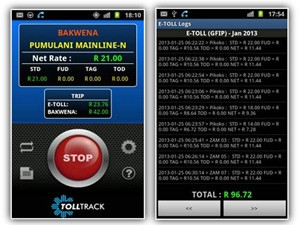
Pretoria-based entrepreneur and software developer Jacques Theyse has developed a mobile application that will allow users to log and audit the amount they pay for using tolled roads between Gauteng, the north and west of the country and Nelspruit, in Mpumalanga.
With implementation of the much-criticised Gauteng e-tolling system imminent, Toll Track aims to simplify tariffs incurred from the web of tolls along the province's roads.
The app - available as of this week on both Android and iOS devices - uses a GPS system that automatically detects e-toll, Bakwena and Trac N4 (to Nelspruit) gantries. Based on the classification of the user's vehicle, Toll Track records gantries passed through while travelling and produces detailed monthly logs, including applicable discounts and net payable amount.
Idea behind the app
Theyse, who is based in Pretoria North, says he first started developing Toll Track towards the end of last year, after months of trying to figure out what he was paying for the toll roads he travels on a regular basis.
"I use the N1 every day, passing Bakwena tolls, and found it difficult to actually tell how much I was paying each month. [The bank] sends you SMSes to inform you that a certain amount has been deducted from your account, but there is no real way of auditing it. Plus it costs about R28 a month for a detailed statement - and so I thought to write an app that would allow me to audit the fees I am paying."
Theyse says when the e-toll debate heated up and convoluted tariffs and clauses were introduced, he decided it would be worthwhile to extend Toll Track - using the same principle - to the e-toll gantries.
"The e-tolls have a very complicated cost structure and are very different to the tolls that are already in operation. To help motorists get an idea of what they will be paying when - or if - e-tolls come into effect, I developed the business model according to the tariffs laid out in the Government Gazette."
As tariffs change, says Theyse, Toll Track's algorithms will be developed accordingly to give motorists up-to-date figures. "It will be an ongoing work in progress."
Business application
While the app is currently a free download via Apple and Android app stores, Theyse plans to bring out a "pro version" geared towards businesses, which will be a paid-for service. "The current free app is supported by advertising. The new pro app won't feature any adverts."

The business-oriented version, he says, will act as an informative planning tool for businesses that need to know what a given trip will cost the company. "It will allow them to see just how much a particular job will cost them in terms of travel expenses, so that they can build the cost in to quotations, for example."
Theyse notes the app was made for motorists and businesses, and is independent of the SA National Roads Agency (Sanral), or other toll-associated bodies.
In terms of user privacy, Theyse says no personal parameters are entered into the app. The user need only enter a vehicle description and classification. "The app will only send information about the gantries passed and costs involved, but no private information will be sent."
Theyse also plans to add a function that will allow motorists to send details of e-toll usage to the Toll Track Web site. "When this function comes in, the user will have to choose to be part of the collaborate effort to upload their data to the Web site anonymously, so users will need to give consent."
For now, he says, Toll Track is a closed system, and all data and information is held locally on the device.
Expensive exercise
Theyse says a fundamental idea behind the app is to eventually have a live tracking system. "On the Web site you will have the option to upload e-toll data to a central database. No personal information, just the gantry and cost involved. From that database, users will be able to get an idea of what a particular gantry earned for that month.
"This obviously depends on how many participants there were, but it would be handy in determining an estimate at least of what government is making from the tolls. Depending on how many would participate."
He says the live tracking system may be a useful for other bodies - like the Opposition to Urban Tolling Alliance - in that they would be able to "justify opposition" by having details of the amounts of money involved.
Despite current Sanral campaigns indicating the average road user will not pay more than R100 per month, Theyse believes e-tolls will be "an expensive exercise", particularly for those who frequently travel between Johannesburg and Pretoria. Putting a number to monthly e-toll costs, he says "about R400" sounds more like it.
Theyse says the app will continually be tested and updated. Toll Track is currently compatible with Android devices versions 2.3 and above, the iPhone 4, 4S and 5, and iPad. Windows 7 is the next platform in sight, while Theyse says a native BlackBerry version of the app may be added later.
Share